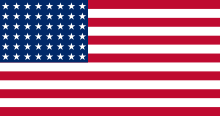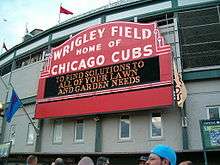1914 in the United States
| 1914 in the United States | |
|---|---|
| Years: | 1911 1912 1913 – 1914 – 1915 1916 1917 |
|
| |
 48 stars (1912–59) | |
|
Timeline of United States history
| |
Events from the year 1914 in the United States.
Incumbents
Federal Government
- President: Woodrow Wilson (D-New Jersey)
- Vice President: Thomas R. Marshall (D-Indiana)
- Chief Justice: Edward Douglass White (Louisiana)
- Speaker of the House of Representatives: Champ Clark (D-Missouri)
- Congress: 63rd
Events
January–March
- January 1 – The St. Petersburg-Tampa Airboat Line starts services between St. Petersburg and Tampa, Florida, becoming the world's first airline to provide scheduled regular commercial passenger services with heavier-than-air aircraft, with Anthony Jannus (the first federally licensed pilot) conveying passengers in a Benoist XIV flying boat. Abram C. Pheil, mayor of St. Petersburg, is the first airline passenger, and over 3,000 people witness the first departure.
- January 5 – The Ford Motor Company announces an eight-hour workday and a minimum wage of $5 for a day's labor.
- January 9 – The Phi Beta Sigma fraternity is founded at Howard University (an historically black university) in Washington, D.C.
- February 13 – Copyright: In New York City the American Society of Composers, Authors and Publishers is established to protect the copyrighted musical compositions of its members.
April–June

Wrigley Field in 2009.
April 23: Weeghman Park, later known as Wrigley Field, opens
April 23: Weeghman Park, later known as Wrigley Field, opens
- April 9 – Tampico Affair, involving U.S. Navy sailors in Mexico.
- April 11 – Alpha Rho Chi, a professional architecture fraternity, is founded in the Hotel Sherman in Chicago.
- April 14 – The city of Irving, Texas, is incorporated.
- April 20
- Ludlow Massacre (Colorado Coalfield War (1913–14)): The Colorado National Guard attacks a tent colony of 1,200 striking coal miners in Ludlow, Colorado, killing 24 people.
- President Woodrow Wilson asks Congress to use military force in Mexico in reaction to the Tampico Affair.
- April 21 – United States occupation of Veracruz: 2,300 U.S. Navy sailors and Marines from the South Atlantic fleet land in the port city of Veracruz, Mexico, which they will occupy for over 6 months. The Ypiranga incident occurs when they attempt to enforce an arms embargo against Mexico by preventing the German cargo steamer SS Ypiranga from unloading arms for the Mexican government in the port. On April 22 Mexico for the time being ends diplomatic relations with the U.S.
- April 23 – The baseball stadium Weeghman Park, later known as Wrigley Field, opens in Chicago.
- May 14 – Woodrow Wilson signs a Mother's Day proclamation.
- June 1 – Woodrow Wilson's envoy Edward Mandell House meets with Kaiser Wilhelm II of Germany.
July–September
- July 4 – Lexington Avenue bombing: 4 people are killed in New York City when an anarchist bomb intended to kill John D. Rockefeller explodes prematurely in the plotters' apartment.
- July 11
- Baseball legend Babe Ruth makes his major league debut with the Boston Red Sox.
- USS Nevada, the United States Navy's first "super-dreadnought" battleship, is launched.
- Over 5,000 attend a rally in Union Square, Manhattan, called by the Anti-Militarist League to commemorate the anarchists killed in the July 4 Lexington Avenue bombing.[1]
- July 18 – The Signal Corps of the United States Army is formed, giving definite status to its air service for the first time.
- August 1 – New York Stock Exchange closed due to war in Europe, where nearly all stock exchanges are already closed.
- August 4 – German troops invade neutral Belgium at 8:02 AM (local time). Britain declares war on Germany for this violation of Belgian neutrality. This move effectively means a declaration of war by the whole British Commonwealth and Empire against Germany. The United States declares neutrality.
- August 15
- The Panama Canal is inaugurated with the passage of the steamship U.S.S. Ancon.
- A dismissed servant kills seven people at architect Frank Lloyd Wright's studio and home, Taliesin in Wisconsin (including his mistress, Mamah Borthwick), and sets it on fire.
- September 1 – The last known passenger pigeon "Martha" dies in the Cincinnati Zoo.
- September 26 – The U.S. Federal Trade Commission (FTC) is established by the Federal Trade Commission Act.
- September 30 – The Flying Squadron is established to promote the temperance movement.
October–December
- October 7 – Joseph Patrick Kennedy Sr. marries Rose Fitzgerald in Boston.
- November 16 – A year after being created by passage of the Federal Reserve Act of 1913, the Federal Reserve Bank of the United States officially opens for business.
- November 23 – U.S. troops withdraw from Veracruz. Venustiano Carranza's troops take over and Carranza makes the town his headquarters.
- November 28 – World War I: Following a war-induced closure in July, the New York Stock Exchange re-opens for bond trading.
- December 12 – The New York Stock Exchange re-opened, having been closed since August 1, 1914, except for bond trading.
- December 17 – U.S. President Woodrow Wilson signs the Harrison Narcotics Tax Act (initially introduced by Francis Burton Harrison).
Undated
- The Port of Orange, Texas, is dredged for the fabrication of vessels for the United States Navy.
- The United States Power Squadrons is formed.
- Phi Sigma, a local undergraduate classical club, is founded by a group of students in the Greek Department at the University of Chicago.
- The American Radio Relay League is founded.
- Henry Ford sells 248,000 cars.
Ongoing
- Progressive Era (1890s–1920s)
- Lochner era (c. 1897–c. 1937)
Births
- January 12 – Edward Gurney, U.S. Senator from Florida from 1969 to 1974 (died 1996)
- January 31 – Carey Loftin, actor and stuntman (died 1997)
- May 9 – Denham Fouts, prostitute (died 1948)
- June 2 – Johnny Bulla, golfer (died 2003)
- June 6 – H. Adams Carter, mountaineer, journalist and educator (died 1995)
- June 12 – Bill Kenny, African American tenor vocalist (died 1978)
- June 19 – Alan Cranston, U.S. Senator from California from 1969 to 1993 (died 2000)
- July 14 – Baruch Korff, rabbi (died 1995)
- September 9 – Marjorie Lee Brown, mathematician (died 1979)
- September 26 – Francois Henri "Jack" LaLanne, fitness and dietary health trainer (died 2011)
- December 18 – Chuck Apolskis, American footballer (died 1967)
- December 20 – Harry F. Byrd, Jr., U.S. Senator from Virginia from 1965 to 1983 (died 2012)
Deaths
- January 28 – Shelby Moore Cullom, United States Senator from Illinois from 1883 till 1913. (born 1829)
- February 14 – Augustus Octavius Bacon, United States Senator from Georgia from 1895 to 1914. (born 1839)
- February 23 – Henry M. Teller, United States Senator from Colorado from 1876 till 1882 and from 1885 till 1909. (born 1830)
- March 26 – Benjamin Franklin Keith, vaudeville theatre owner (born 1846)
- March 28 – Randolph McCoy patriarch of the McCoy clan during the Hatfield-McCoy feud (born in 1825 from United States)
- May 9 – C. W. Post, American businessman, founded Post Foods (born 1854)
- May 23 – William O'Connell Bradley, United States Senator from Kentucky from 1895 till 1899. (born 1847)
- June 14 – Adlai E. Stevenson, 23rd Vice President of the United States from 1893 to 1897. (born 1835)
- August 6 – Ellen Axson Wilson, wife of Woodrow Wilson, First Lady of the United States, (born 1860)
- August 25 – Powell Clayton, United States Senator from Arkansas from 1868 till 1871. (born 1833)
- September 13 – Charles N. Felton, United States Senator from California from 1891 till 1893. (born 1832)
- December 22 – William Stanley West, United States Senator from Georgia in 1914. (born 1849)
See also
External links
-
 Media related to 1914 in the United States at Wikimedia Commons
Media related to 1914 in the United States at Wikimedia Commons - "1914". Timeline. Digital Public Library of America.
References
- ↑ "Plan Big Meeting For Dead Bomb Men: Demonstration in Union Square by Anti-Militarist League Announced for Tomorrow" (pdf). The New York Times. Adolph Ochs. 1914-07-10. p. 1. Retrieved 2008-07-13.
This article is issued from Wikipedia - version of the 11/17/2016. The text is available under the Creative Commons Attribution/Share Alike but additional terms may apply for the media files.